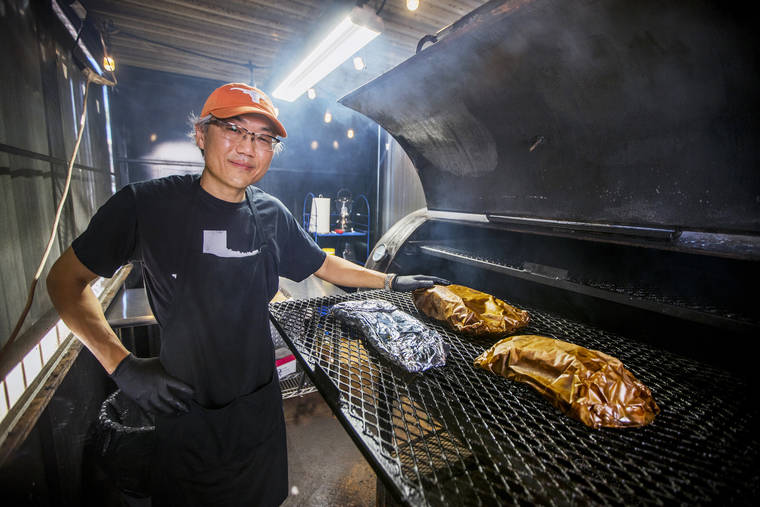Weekly Eater: Texas tradition thrives at Wahiawa’s Sunset Smokehouse

DENNIS ODA / DODA@STARADVERTISER.COM
James Kim mans the smoker at Sunset Smokehouse in Wahiawa.

DENNIS ODA / DODA@STARADVERTISER.COM
James Kim with a platter of the food available at Sunset Smokehouse in Wahiawa.


James Kim hasn’t had much sleep lately, but it’s not because he’s a new dad. It’s because of his other babies, the beef briskets, pork spareribs and the occasional beef ribs he tends to so lovingly at his new restaurant, Sunset Smokehouse, in Wahiawa.
He’s probably never been as apologetic in his life either, addressing rumblings ranging from short hours, to running out of menu items, to remaining true to central Texas craft barbecue, which differs from saucier views of barbecue, typically the Kansas City style of ketchupy molasses and Worcestershire-based sauce favored by nonspecialty restaurants across the country. Think McRib.
Well, Kim’s ain’t that.
“The saying in Texas is there’s 20 million different opinions about barbecue,” said Kim, who grew up in Coppell, Texas, before moving to Austin for high school, then returned as a consultant for Samsung for a decade. “Everyone has an opinion. There isn’t a right way or wrong way, but here at Sunset Smokehouse we stay true to the central-Texas style that uses real wood, fire and a lot of labor. It’s a very old-school style,” he said.
“We just use a salt-pepper rub, keep it real simple, let the meat do the talkin’, and if you want to use sauce, well, that’s up to ya’ll but we recommend not to put the sauce on top of the meat, but on the side, for dipping. That’s the best way. At least that’s how I grew up with it.”
Don't miss out on what's happening!
Stay in touch with breaking news, as it happens, conveniently in your email inbox. It's FREE!
ALTHOUGH TEXAS is generally known for barbecue with a savory “mop” sauce — named for the claim that a mop was needed to baste huge slabs of beef while they cooked — German and Czech butchers introduced smoking techniques and smoked sausages to Central Texas in the 1800s. The specialty of the region became beef brisket in a salt-and-pepper crust, or bark.
The black bark can scare the non-initiated into thinking the meat is burnt, but it is a desired part of the finished product. It’s formed through the Maillard reaction that occurs when amino acids and sugars meet heat, creating chains of hundreds of flavor compounds. Even if you failed chemistry, the result is obvious. Sunset Smokehouse’s barbecue tastes incredible!
I’M NOT usually a fan of beef barbecue, finding the meat dry and tough. Brisket is particularly difficult to work with because it’s the chest muscle that supports 60 percent of the animal’s body weight, requiring a large amount of connective tissue that needs to be broken down. So, back to those German and Czech butchers: The brisket was the cut no one would buy, but they couldn’t let it to go to waste. They turned to smoking to preserve it.
Three centuries later, Kim is carrying on the same tradition, slow-cooking the meat with a clear smoke at about 250 to 275 degrees in an offset, or barrel, smoker.
“If you see a white smoke, it means there’s not a complete combustion of wood,” said Kim, who finds that resulting flavor undesirable. “You don’t want a saturated smoke flavor, but a kiss of smoke.”
Although the wood of choice used in central Texas is post, or iron, oak, Kim said its difficult to ship enough wood into Hawaii. He’s been using a combination of mesquite and hickory, but not kiawe, which Kim says burns his eyes.
FROM START to finish, it takes about 14 hours to complete a smoke using a 500-gallon smoker that can produce about 250 to 300 pounds of meat a day. He starts the process each Thursday for the weekend, and gets little sleep because he is constantly monitoring the process over three days.
He is having a second 1,000-gallon smoker built in Texas to increase capacity because the meat goes so quickly, often within two hours of opening, causing him to move up his closing time from an ambitious 6 p.m. to a more realistic early afternoon.
Those lucky enough to score a couple of pounds are in for a treat. Kim’s brisket arrives from the smoker jiggly from a combination of rendered fat and juice, wrapped in butcher paper to prevent evaporation and protect the bark. It’s set to rest while it reabsorbs juices, resulting in moist, tender meat that drapes nicely after it’s cut, instead of lying stiff. The brisket is easy to pull apart, so some central Texas institutions cling to the tradition of serving their barbecue only with forks. At Sunset Smokehouse, plastic knives are available on request.
Meats here are sold by the half or full pound, at $13/$25 for USDA prime Angus brisket; $12/$22 pork ribs; $11/$20 pulled pork; or $6 for a sweet beef sausage in pork casing that delivers a crispy snap when you bite into it.
Orders are plated onto trays for indulging family style. Sides (at $3 for a single serving, $8 for a pint or $14 for quart) are made in-house, including German-style potato salad with the sour of vinegar and mustard; creamed corn in a sweet, thick mixture of milk and heavy cream; and cayenne-and-habanero-spiced baked pinto beans bearing the influence of Mexico.
The only thing not Texas about the meal is an accompaniment of Hawaiian rolls instead of bread slices, for those who want to make an impromptu sandwich of meat and a side of ATX slaw (peppery and creamy) or Hill slaw (sweet and tangy).
“I had to switch to Hawaiian rolls because everyone was throwing the bread away,” said Kim.
KIM MOVED here three years ago to be closer to his wife’s family. After less than two months, he got hungry for barbecue, but couldn’t find what he wanted, and that got the couple thinking that a food truck might be a fun hobby.
“A lot of pitmasters in Texas get started this way. Barbecue in Texas is about family and friends, having a lot of beer, exchanging ideas and techniques.”
The food truck launched at Sunset Beach in 2016, and after a couple of moves ended up in Wahiawa last June. The Wahiawa shop opened in April.
The business now consumes his life.
Patting one of his finished briskets, he said, “These require a lot of attention. I think I give these more attention than my newborn son.”
SUNSET SMOKEHOUSE
23 S. Kamehameha Highway, Wahiawa
Food: ****
Service: ***1/2
Ambiance: ***1/2
Value: ****
>> Call: 476-1405
>> Hours: 11 a.m. to 2 p.m. Fridays and Saturdays; 11 a.m. to 1 p.m. Sundays
>> Prices: About $60 for a family of four
Ratings compare similar restaurants:
**** – excellent
*** – very good
** – average
* – below average
Nadine Kam’s restaurant reviews are conducted anonymously and paid for by the Star-Advertiser. Reach her at nkam@staradvertiser.com.




